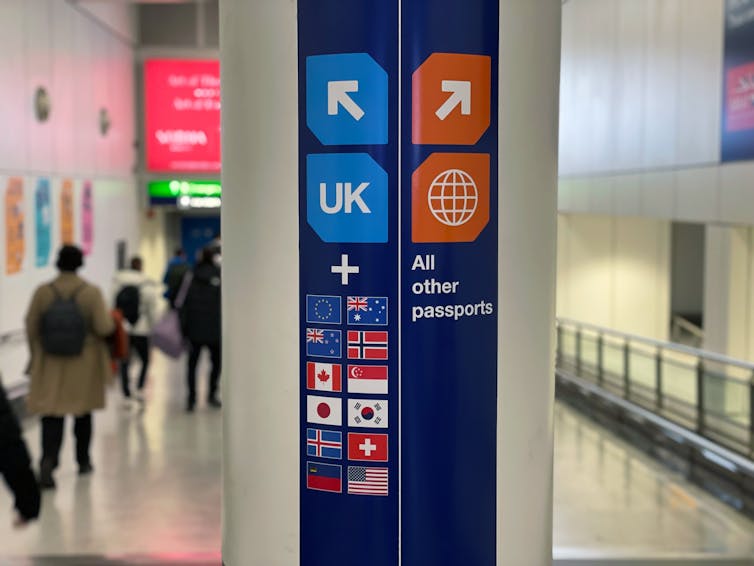Earlier this week, it seemed possible that young people in the UK might soon be able to travel freely to work and live in Europe again. The European Commission laid out proposals to open mobility to millions of 18- to 30-year-olds from the EU and UK, allowing them to work, study and live in respective states for up to four years.
But the government swiftly rejected the offer, saying that “free movement within the EU was ended”. The Labour party followed suit, saying it has “no plans for a youth mobility scheme”. This has already provoked an angry response from Britons young and old who are “furious” about the rejection of the scheme.
The commission has been strongly opposed to making any concessions to the UK since Brexit, so this could have been a breakthrough moment in a politically difficult area. The UK already runs youth mobility visa programmes with ten non-EU countries, most notably Australia. But the possibilities for a UK-EU scheme have so far been derailed by lingering concerns over the highly charged politics of free movement.
Since Brexit, the UK has been considering expanding the current scheme. In the run-up to Brexit withdrawal, expanding youth mobility was floated as a way to alleviate anticipated labour market shortages with the end of free movement. Ultimately, the politics were considered too toxic at the time to pursue this, and the government declined to enter into any negotiations on mobility.
A different approach
The commission’s proposals are far from being equivalent to free movement. The period of stay would have a time limit, and other conditions could be requirements for health insurance and proof of sufficient funds.
However, much of the rhetoric on the future for a “global Britain” after Brexit was underpinned by the UK’s new immigration system being blind to nationality. These youth mobility proposals would in some ways give preferential treatment to EU nationals through equivalent tuition fees to UK students, and exemptions from the UK’s NHS immigration surcharge.
The proposals also leave open the possibility of bringing family members, as the UK curtails these rights for other immigrants. The suggested time limit of four years is also longer than the two-year stay granted to the majority of existing youth mobility visa holders from non-EU countries.
Despite rejecting these latest proposals, it’s evident that the UK is open to some sort of exchange programme with EU states, but on its own terms. In 2023, the UK approached several EU member states, including France, with the intention of negotiating bilateral deals.
The government likely prefers a state-by-state approach in order to encourage immigration from certain nationalities while deterring it from central and eastern Europe, and to avoid replicating the kind of free movement that was considered a key factor in Brexit. The commission, on the other hand, prefers an EU-wide scheme to avoid preferential treatment, and is discouraging member states from signing deals with London.
While Labour’s rebuffing is indicative of their electoral strategy to ensure they don’t alienate Brexiteers, some senior Labour officials suggest the party is more open to a deal. After all, having no plans is not the same as completely ruling it out. Whoever forms the next government might reconsider.
The history of youth mobility
Young people around the world view cultural exchange schemes as a rite of passage. With the UK unwilling to associate with programmes like Erasmus+ or Creative Europe, the opportunities for young Britons and Europeans to benefit from cultural, educational and training exchanges are diminished. While the new Turing scheme has replaced Erasmus in the UK, this is not a reciprocal programme – meaning the UK does not benefit from European students studying in the UK.
The UK’s youth mobility scheme is the oldest feature of the immigration regime. A vestige of Empire, it was originally set up in the postwar period to foster cultural exchange between Commonwealth states.
Originally called the working holidaymaker visa, it was intended as a route principally for cultural exchange and soft power, not labour. The scheme has long been based on a set annual quota, with varying numbers of visas available to participating states on a reciprocal basis.
Geopolitics and the legacies of colonialism have long been at the heart of the scheme. There are unlimited visas available to the so-called “old” Commonwealth states, particularly Australia, while other countries like Japan or Monaco face a cap with applicants entering into a ballot. Recently, more expansive rights for some participating states such as Australians and South Koreans include an older age limit and a longer period of stay.
The visa is temporary (two years), but liberal. There are no sponsorship requirements, meaning that visa holders can work in almost any part of the labour market. In 2022, 16,900 visas were granted, primarily to citizens of Australia (45%), New Zealand (19%) and Canada (16%).

As global demand for labour migration has increased, youth mobility schemes have been used to alleviate labour market demands. As a result, some schemes have introduced conditional attachments to work in rural agriculture or horticulture for a period.
Some in the UK have championed these latest proposals as a way to fill the stark labour market shortages. But the lack of sponsorship on the visa means the government has little idea or control over what sorts of jobs participants would occupy.
Temporary visa programmes are also ripe for worker exploitation. One EU official has questioned the UK’s motives in this regard, asking whether the intention of a scheme would be to bring in young Europeans “to get paid minimum wage rates, without the in-work benefits”.
A UK-EU scheme could be a boost to the economy, in particular for universities and those struggling with recruitment in hospitality and tourism. It could also be a positive concession for UK-EU relations, and most importantly, restore the opportunities young Britons and Europeans once had.

